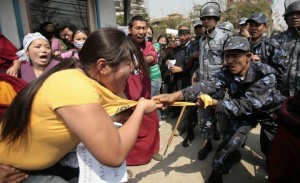The severity of Nepal’s crackdown on it’s once vocal Tibetan refugee communities became apparent on March 19, when an American citizen wearing a jacket reading “Team Tibet” and his Canadian friend were arrested and briefly detained by police forces in Kathmandu.
The story was only made public by the American on May 21, who wished to avoid putting in jeopardy an immigration process his brother was involved in at the time.
Ngodup Tsering, a resident of Minnesota and a man of Tibetan ancestry, was visiting Kathmandu’s famed Swayambhunath Temple on March 19 when he was approached by 15 armed Nepali policemen; he was required to remove the “Team Tibet” jacket, arrested, and taken to a district police station. Although Tsering’s friend wore no clothing related to Tibet, he too was arrested. Tsering reports that while in detention, Nepali security informed him that “these words [‘Team Tibet’] are illegal in Nepal,” and that the Nepali police have “direct and clear orders from China.” After communicating with the American embassy in Kathmandu, the two men were released, though the jacket was not returned.
The arrest appears to confirm reports of an increasing crackdown on Tibetans and pro-Tibet activism in Nepal. Tibetan refugees living in Nepal have enjoyed relative freedom for many years, and areas like Kathmandu, Pokhara, Mustang, and Gyalsa have existed as both vibrant scenes of Tibetan culture and focal points of pro-Tibet political activism.
Since the 2008 uprising in Tibet and the subsequent security crackdown by the Chinese government however, China has developed increasingly close diplomatic and economic relationships with Nepal, quickly becoming the nation’s top foreign direct investor. As an April 1 report from Human Rights Watch (HRW) details, strengthening ties between China and Nepal have correlated with an increasing crackdown on Tibetan refugees living in Nepal. HRW and other rights groups have argued that China’s investment’s have bought it increased control over Nepal’s Tibetan refugee policies.
Though reports from Nepal’s Tibetan communities in recent years had already revealed a laundry-list of government abuses such as arbitrary arrest and detention, silencing of free speech, and intrusive surveillance, Tsering’s arrest makes plain just how closely Nepal is enforcing the crackdown on Tibetans, and the degree to which Nepal is willing to go to prevent the pro-Tibet activism that once thrived there.
Though Tsering and his friend were released after only a short detention, the fate of Nepal’s Tibetan refugee communities in the coming years appears much less certain.






 Print
Print Email
Email